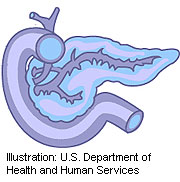
WEDNESDAY, April 8, 2015 (HealthDay News) — Pancreatic cancer remains a “silent killer” because it is typically discovered too late for treatment to be very effective.
Now, a small new study hints — but cannot prove — that using MRIs to screen people at high genetic risk for the disease might help spot tumors early.
“An MRI-based protocol for the surveillance of individuals at risk for developing pancreatic cancer seems to detect cancer or premalignant lesions with good accuracy,” a team led by Dr. Marco Del Chiaro, of the Karolinska Institute in Stockholm, Sweden, concluded.
Still, two experts in the United States urged caution in interpreting the results of such a short, small trial, saying much more study is needed.
The findings were published online April 8 in JAMA Surgery.
One expert applauded the effort, at least. “Reducing the incidence of this disease, even for a few, is advantageous and further research into battling this deadly malignancy is needed,” said Dr. Daniel Labow, associate professor of surgery and surgical oncology at the Icahn School of Medicine at Mount Sinai, New York City.
According to the American Cancer Society, pancreatic cancer remains a leading cancer killer. Each year, nearly 49,000 Americans will be diagnosed with the disease, and more than 40,000 will die from the illness.
Del Chiaro’s team said that about one in every 10 pancreatic cancer patients have a family history of the disease. That means that people with such histories could be candidates for some form of early detection screening.
In the study, the investigators used MRI to screen 40 patients (24 women and 16 men), average age 50, with a high genetic risk for pancreatic cancer. Pancreatic tumors were found in 16 (40 percent) of the patients. Five of them had surgery and the other 35 remain under surveillance.
The use of noninvasive MRI might someday be an effective, cost-effective means of spotting pancreatic cancer early, the authors speculate. However, “because of the small number of patients and the divergent results, this study did not allow evaluation of the efficacy of MRI as a single screening [tool],” the authors wrote.
Another expert not connected to the study was dubious that the test might ever have real value, however.
Dr. Craig Devoe is acting chief of hematology and oncology at North Shore University Hospital in Manhasset, N.Y. While he said he “commends” the team for the research, he called the results of the trial “lackluster.”
“In this study of 40 patients, 40 percent of patients were found to have an abnormal MRI that needed more follow-up; however, only five were actually found to have pancreatic cancer,” Devoe pointed out.
He also noted that Del Chiaro’s team considered benign lesions on the pancreas to be “target lesions” for screening. “However, I do not consider these lesions to be good endpoints because we do not know the natural history of these lesions (most do not ever become cancer) and we run the risk of overtreating such patients,” Devoe said.
“The concern is that patients may undergo an excessive number of [risky] surgical procedures (pancreatectomy) — for benign lesions,” explained Devoe, who is also affiliated with Long Island Jewish Medical Center in New Hyde Park, N.Y.
Finally, Devoe said, the study is just too small and short in duration to say whether spotting the tumors earlier helped people long term.
“Pancreas cancer has a notorious tendency to metastasize [spread] even in its earliest stages,” Devoe said. “Finding a lesion in its early stages and removing it does not necessarily imply that a patient will be free of disease over the next couple of years and ultimately not die of metastatic pancreas cancer.”
Labow agreed that the study may provide more questions than answers.
“MRI is a safe, effective and sensitive test for evaluating the pancreas,” he said, but most people would not be candidates for screening and the question of how often to screen remains unclear.
More information
The American Cancer Society has more about pancreatic cancer.
Copyright © 2026 HealthDay. All rights reserved.

